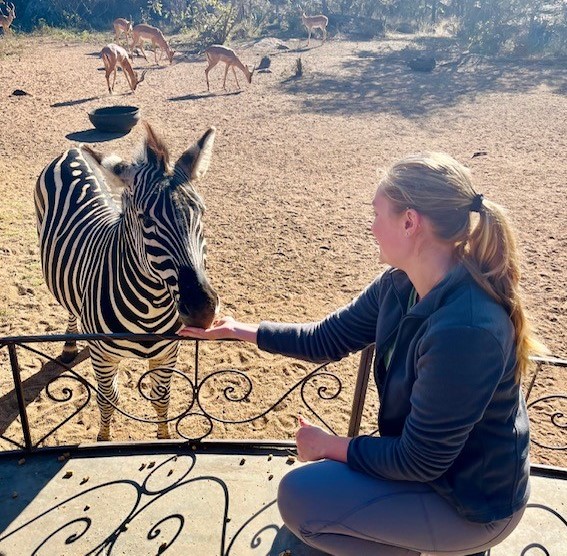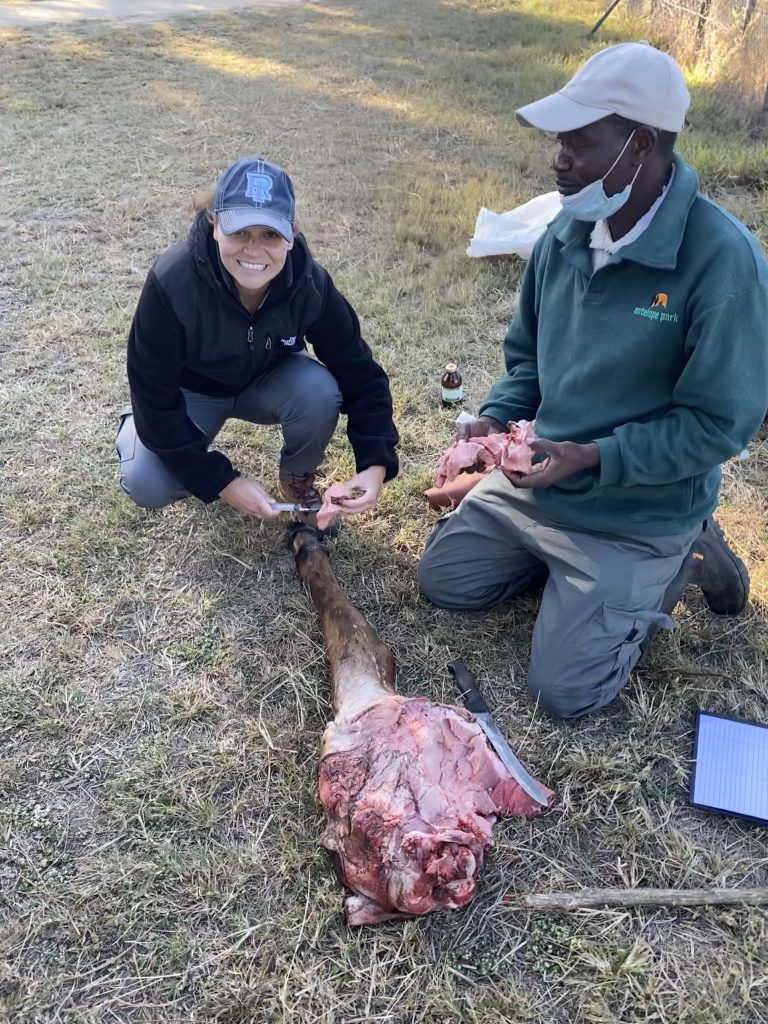Africa is one of the places most people never get the chance to step foot in during their lifetime. When we had this opportunity to go especially for our veterinary technology program I was all on board. This was my first time out of the USA and I was definitely taken back by how different other parts of the world are. The people here were one of the most welcoming and friendly I have ever met, making this experience exceptionally great. I was convinced, like many of my other classmates, that we would not enjoy some of our food options since we can be very picky. I think I ate more here than I do back home and I am dreading having to go back to our home food. It is hard to pick out a favorite activity we did when everything was just life changing and amazing. Seeing animals in their natural environments and so close to us sparks a joy in you like nothing else. Getting to help work hands on with hyenas helping them move to a new enclosure and get base line lab work was amazing to be experience. Touching and feeding elephants was another awesome interaction.
We learned so much about human animal conflict and now understand why their wildlife can be such a problem for them. I was still able to learn so many thing about animals while on this trip from our guide and will be taking that knowledge home with me. Getting to visit their veterinary university and interact with students was also eye opening because they didn’t have many of the resources we have in the states. Driving around the whole country you can see the difference in city life versus rural Africa and it was an experience to see how life treats them and their day to day differences. I went into this trip excited to just see animals and happy where I was in my life at the time. Coming out, I have learned my real passion is to work with wildlife/conservation and I couldn’t be happier. If you have a chance to do a study abroad it is very much worth it and life changing to experience other cultures and ways of life.
-Katelyn, SPC Zimbabwe Vet Tech Program, June 2022
This study abroad trip to Zimbabwe has been a once in a lifetime experience. Full of amazing sights, cross cultural experiences, and new and different foods. One thing that has stuck out to me during this time is the time we spent in the local craft market. It was quite a cultural experience. It was very overwhelming between the sheer number of items to look at in a small space, and all of the shop owners pulling you in to try and sell to you. They would try to relate to you by calling us “sister”, some tried to use our compassion to make us buy saying “no one has bought from me in days”. The haggling for a better price on the handmade items was something I have never experienced before, and was certainly not good at, though I did try. All I wanted was to end it fast so I could run to the bus and be done. Having the shop owners ask for trades instead of money was also interesting. They were asking for my (very cheap) hat or sunglasses or water bottle in trade instead of money for some of the beautiful works of art they had on display. One even kept asking for my hair tie. Some students they even asked for their socks and old shoes. This was extremely odd to me, as their work is worth so much more than the value of the items they were asking for. As it did not seem fair (and there were some items i was not willing to part with), I did not end up trading anything, but watching the other students trade was fascinating. The cultural aspect of the market in Zimbabwe was so different from anything in the United States that it is something I will remember for a long time to come.
– Bridgette , SPC Zimbabwe Vet Tech Program, June 2022
The cultural aspect of the market in Zimbabwe was so different from anything in the United States that it is something I will remember for a long time to come.
Wildlife medicine was never something I really thought about before this encounter. I never understood what mechanisms, equipment, supplies, and people are needed to preform necessary procedures on these animals to provide proper care for their overall health and well-being. For many, not much is known about treatments, handling, or care. While deworming and dipping these large cats, I observed their behavior.
The deworm consisted of 5 ml bremamectin injected into a 2×4 cm^2 piece of antelope.
While approaching the cage, the 4 subject lions became slightly aggressive. The difficulty of getting each lion to obtain the dewormer called for multiple employees distracting other lions, funneling the correct lions into the desired cage and position, and correctly distributing the dewormer into each lion separately.
This technique demonstrated many difficulties wildlife veterinary care teams face. Some of these difficulties include ensuring an adequate amount of dewormer in each lion, maintaining human and lion safety, and even correctly recording which lion received the dewormer and at what time.
Firstly, it was extremely difficult to inject bremamectin into the cow meat. After drawing up 5ml and placing the needles into the meat, it was very difficult to inject all of the solution without any leaking from the piece of meat. This technique unfortunately allows great room for human error if the person injecting the solution doesn’t notice if there is any leakage.
Secondly, maintaining human and lion safety did not come easy. One person was designated to distract the non-subject lion with a non-injected piece of meat. This lead to lions fighting for dominance, approaching the cage, and for humans, getting close enough to the cage to distract them.
Lastly, it was difficult to record which lion received the dewormer as they are constantly moving throughout the cage. Confirmation between the workers, which consisted of calling out the names of the subject lions when the dewormer was given, increased the accuracy of the data.
As hectic as this process may seem as a veterinary student with little to no wildlife experience, this treatment was done relatively quickly with the help of the veterinary students and the smaller subject lions. With many eyes on the subject lions, it seemed as though there was less room for error while recording data and ensuring each lion was dewormed. I enjoyed learning about this process in antelope park as it is a common treatment lions in captivity receive. I do hope to learn about the differences between antelope park’s treatment plan versus other facilities and expand my knowledge on deworming wildlife.
– Brianna , SPC Zimbabwe Vet Tech Program, June 2022


